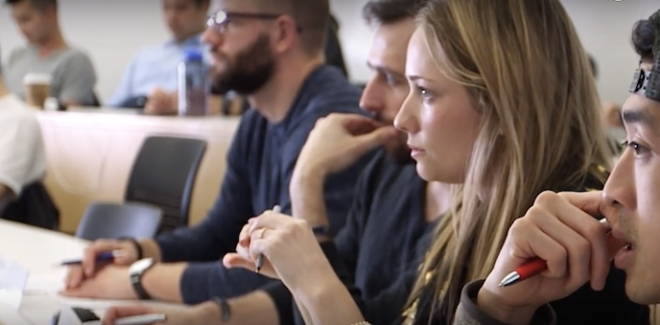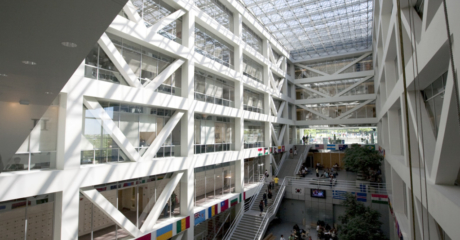When Yasmin L’Estrange moved to New York City from Australia to begin a new career in human resources with Citigroup, he knew an MBA would be helpful to his future path at a global banking giant. But he certainly didn’t want to quit his job as a senior vice president to go back to school, so he explored one of the several Executive MBA options at Columbia Business School.
“When I stepped onto the Columbia campus,” recalls L’Estrange, “I felt the same attachment to the school I had with Sydney,” where he had earned his bachelor’s degree in psychology and his master’s in human resource management. “When it came to applying, I only applied to Columbia, reasoning that if I didn’t get in, it wasn’t meant to be!”
He, of course, got in and the 33-year-old graduated with his MBA in May with absolutely no regrets. “The best part of the executive program is that every Monday morning, I walked into work with a new toolkit of thoughts from my Saturday classes, and it surprised me how I could apply even remotely distant ideas into my work.”
When it comes to EMBA students in New York, L’Estrange has plenty of company who feel the same way. With its three New York City-based EMBA programs and two partnership options in London and Hong Kong, Columbia Business School enrolls more EMBA students than any other program in the world. In any given year, the school brings in more than 400 EMBA candidates annually.
The cornerstone of the school’s executive offerings is its weekend programs. The traditional alternating Friday and Saturday class option is a 20-month-long experience that launches every August. Launched in 1968, the program enrolls 144 students a year. Columbia’s EMBA NY Saturday option that began in 2011 enrolls 130 students annually. The 24-month-long program, which starts every May, was aimed around addressing waning corporate sponsorship in the marketplace and targeting up-and-coming high flyers. The 20-month EMBA Americas EMBA, which enrolled its first class in 2013, brings in 40 students a year and tends to draw more family business owners and entrepreneurs.
They are not cheap. The price tag on each of the three programs is $208,680. But Columbia’s EMBA is the best-ranked program in the New York metro area. It’s taught by world-class faculty who are among the best Columbia has to offer and attracts some of the most accomplished executive students in the world. It is well-staffed with seven full-time professionals dedicated to EMBA students and a career management team of 14 staffers dedicated to the executive programs.
And unlike many other rival EMBA options, this is not a lite-version of an MBA. The school still requires either a GMAT, GRE or Executive Assessment score to get in. And in all of Columbia’s programs, the school guarantees 36 contact hours per class or a total of 600 contact hours during the program. That’s a high integrity standard, the same number of hours a full-time MBA student spends in class at Columbia. The rigor of that education can be challenging for professionals juggling their jobs and families so the school offers every student 40 free hours of tutoring support, a rare perk in an EMBA.
When professionals start their EMBA at Columbia, they are assigned to a cluster of 30 to 70 students. A student’s cluster will take all of its first-year core classes together to get the same kind of bonding experience typical in a full-time, residential MBA. Clusters are, in turn, divided into learning teams of about five students from diverse professional and personal backgrounds. For most core courses, students complete assignments together as a team.
No matter which of the New York programs you enroll in, one of the hallmarks of a Columbia EMBA experience is that once students complete the core curriculum, students across all three programs come together to choose from an array of electives and international seminars. Columbia offers a half dozen of those week-long global immersions to EMBA students every year. A recent menu of excursions included Cape Town, Shanghai, Munich, Tel Avi, and Buenos Aires.
“They are meant to be experiential,” says Kelly Martin Blanco, associate dean of EMBA programs. “There is classroom time, speakers coming in, cultural components, and company visits. We take care of everything on the ground and the students have to just get themselves there and home.” One trip is included in the cost of tuition, and 99% of the students take advantage of it.
Another program highlight is something called CBS Matters in which students deliver ten-minute presentations on themselves and their passions. “It helps us achieve a deeper understanding of each other, and that has really been important,” adds Blanco. “We have a class rep who is responsible for orchestrating them, and they occur early on in the program to build connections. Our residence weeks, at the beginning of each core term, is also a bonding experience. All of those things help us foster that sense of community that is hard to get in an EMBA program.”
Columbia requires students to complete 60 credits of graduate-level courses during their four terms of the study. The core curriculum courses of business basics will take up 24 of those credits, with the remaining 36 to be devoted to elective courses in the business school, a possible independent study or graduate-level courses from other university schools. Among the most courses cited by recent students is Climate Finance, taught by Professor Bruce Usher, and Corporate Finance, taught by Professor Donna Hitscherich. L’Estrange concedes he started the core Corporate Finance genuinely worried about it. “I left the course confident and open to the possibility of a career that involved finance,” he says. “The biggest insight was not in the curriculum, but I learned that if you follow the process if you put in the work and you have confidence in yourself, you will be able to achieve something you once thought impossible. After Corporate Finance, my elective selection changed to be finance focused, and it sparked a lifelong interest in finance, particularly in Mergers & Acquisitions.”
The elective on Climate Finance was an intensive half block week class focusing on climate challenges. “Professor Usher is so energetic and well-versed in the topic, and his passion is infectious,” raves T. Robert Zochowski, a 2019 graduate who works as a project director in New York for Harvard Business School. My biggest takeaway from the class is that we have the technology and know-how to solve the majority of the climate challenges.”
Students who have gone through the Columbia experience often say it is one of their favorite parts of the program. “I loved being a part of a vibrant learning community among such great classmates,” adds Zochowski. “Every lunch period on class weekends, I invariably found myself choosing between great programming options often organized and driven by my fellow MBA colleagues. I just attended a small working lunch hosted by the Bernstein Center Leadership and Ethics Board on pay equality and the challenges faced by diverse groups in the workplace.”
The most common question applicants have, according to Blanco, is ‘Can I do this?’ “What is great is we have a tremendous word of mouth,” she says. “Applicants have spoken to other people who have come out successfully and who loved the experience. The expectations today are slightly different. It used to be, ‘If I don’t leave EMBA with that job from X consulting firm, I failed.’ We are seeing less of that now, and it is refreshing. People want to be more creative about what will be next for them and what this investment represents.”
More than half of EMBA students change jobs within their industry or move to something completely different after doing the program, says Blanco. Columbia’s Career Management Center offers students one-on-one coaching, advice on internal job search strategies, workshops on everything from interviewing skills to résumé preparation, self-assessments, job postings, and résumé databases.
“To get the best return on investment in a full-time MBA,” maintains Blanco, “you want to go to the best program you can get into because that is where the recruiters are going to be looking. And the same is true in the EMBA space. If you want to make this investment, you want to make it in the highest quality program you can find. Because that is going to bring the best professors and the best students, you should get the best quality that you can afford.”









